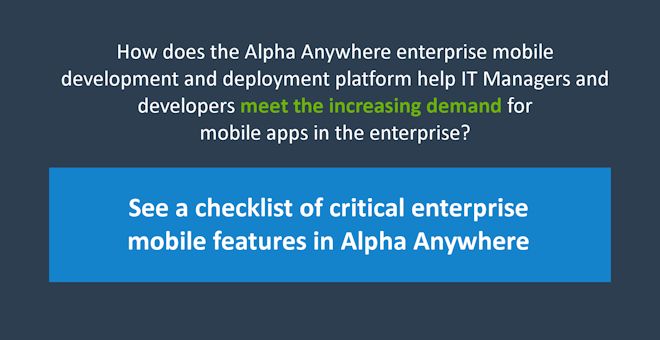 Businesses are building apps to mobilize their workforce. However, building mobile apps in enterprises is too often catch-as-catch-can, overseen by IT with the rest of the company only providing occasional or fitful input. A new report from Forrester says building mobile applications that way can't succeed. Developing enterprise mobile apps can be a costly endeavor. Forrester instead recommends building what it calls mobile IDEA teams. With an IDEA team, you can minimize the risks of failure, developing mobile apps that are successful among employees and consumers.
Businesses are building apps to mobilize their workforce. However, building mobile apps in enterprises is too often catch-as-catch-can, overseen by IT with the rest of the company only providing occasional or fitful input. A new report from Forrester says building mobile applications that way can't succeed. Developing enterprise mobile apps can be a costly endeavor. Forrester instead recommends building what it calls mobile IDEA teams. With an IDEA team, you can minimize the risks of failure, developing mobile apps that are successful among employees and consumers.The report, "CIOs: Organize for Mobile Success,", has advice for CIOs who want to make the most out of mobile, and I'll report more about it in future blog posts. Most of what it recommends requires significant reorganization, but IDEA teams are something you can start using today.
Mobile Development: What are IDEA Teams?
An IDEA team's purpose is to identify when it's time to build a specific app, and then design it, deploy it, and analyze its results, and build any new versions. The team should not be made up primarily of developers -- in fact, the opposite. Forrester says it should be a mix of developers, product managers, project managers, and others. Particularly important is that it include people with hands-on experience on the business side, such as those involved in store operations. It can also include designers, QA professionals, and analytics experts.
IDEA teams are not meant to be permanent. Instead, they should coalesce around a specific business problem and app. They can last as little as a year, although can last longer -- as long as the app is useful. They should be devoted only to that single app in order to ensure that development and deployment is highly targeted at a business problem.
Building teams like this, says Forrester, ensures that apps will be designed and released quickly, and can respond to problems quickly, even after deployment. The report notes, "IDEA teams treat mobile services and apps as products, not projects. IDEA teams build from a core group including a product owner, project manager, and developers, allowing other technologists and business stakeholders to join and exit as needed."
As a model, Forrester points to an IDEA team at Starbucks, composed of employees from store operations in order to prepare baristas and store managers for any change to the customer mobile app; developers; and someone from the legal department to make sure the app meets data privacy policies.
View our tutorial: How to Build a Mobile App







Comment